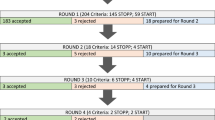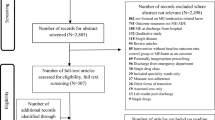Abstract
Introduction
Compliance with medical therapy may be compromised because of the affordability of medications. Inadequate physician knowledge of drug costs may unwittingly contribute to this problem.
Methods
We measured attitudes about prescribing and knowledge of medication costs by written survey of medical and surgical non consultant hospital doctors and consultants in two University teaching hospitals (n = 102). Sixty-eight percent felt the cost of medicines was an important consideration in the prescribing decision, however, 88% often felt unaware of the actual costs. Only 33% had easy access to drug cost data, and only 3% had been formally educated about drug costs. Doctors' estimates of the cost of a supply of ten commonly used medications were accurate in only 12% of cases, too low for 50%, and too high for 38%.
Conclusions
Interventions are needed to educate doctors about drug costs and provide them with reliable, easily accessible cost information in real-world practice.


Similar content being viewed by others
References:
Shulman NB, Martinez B, Brogan D, Carr AA, Miles CG (1986) Financial cost as an obstacle to hypertension therapy. Am J Public Health 76(9):1105–1108
Mishra SK, Satpathy R (2001) Physicians’ attitudes about prescribing and knowledge of the costs of common medications. Arch Intern Med 161(10):1352–1353. doi:10.1001/archinte.161.10.1352
Reichert S, Simon T, Halm EA (2000) Physicians’ attitudes about prescribing and knowledge of the costs of common medications. Arch Intern Med 160(18):2799–2803. doi:10.1001/archinte.160.18.2799
Glickman L, Bruce EA, Caro FG, Avorn J (1994) Physicians’ knowledge of drug costs for the elderly. J Am Geriatr Soc 42:992–996
Hoffman J, Barefield FA, Ramamurthy S (1995) A survey of physician knowledge of drug costs. J Pain Symptom Manage 10:432–435. doi:10.1016/0885-3924(95)00018-T
Fowkes FG (1985) Doctors’ knowledge of the costs of medical care. Med Educ 19:113–117
Allan GM, Innes G (2002) Family practice residents’ awareness of medical care costs in British Columbia. Fam Med 34:106–111
Innes G, Grafstein E, McGrogan J (2000) Do emergency physicians know the costs of medical care? CJEM 2:95–102
Health Division OECD (2006) OECD health data. 6 October 2006 Available: http://www.oecd.org
Court rules in favour of pharmacies in payment row Available: https://www.irishtimes.com/newspaper/breaking/2008/0911/breaking55.htm
Garrison L, Towse A (2003) The drug budget silo mentality in Europe: an overview. Value Health 6:S1–S9. doi:10.1046/j.1524-4733.6.s1.1.x
Seay M, Varma P (2005) Pharmaceuticals: Pharmaceutical cost controls, 2005. End of year issue brief. Issue Brief Health Policy Track Serv 31:1–20
Maxwell M, Heaney D, Howie JGR, Noble S (1993) General practice fundholding: observations of prescribing patterns and costs using the defined daily dose method. BMJ 307:1190–1195
Aaserud M, Dahlgren A, Kosters J, Oxman A, Ramsay C et al (2006) Pharmaceutical policies: effects of reference pricing, other pricing, and purchasing policies. Cochrane Database Syst Rev 2006
Lee TH (2004) “Me-too” products—friend or foe? N Engl J Med 350:211–212. doi:10.1056/NEJMp038215
Cox ER, Jernigan C, Coons SJ, Draugalis JL (2001) Medicare beneficiaries’ management of capped prescription benefits. Med Care 39:296–301. doi:10.1097/00005650-200103000-00009
Hsu J, Price M, Huang J, Brand R, Fung V et al (2006) Unintended consequences of caps on medicare drug benefits. N Engl J Med 354:2349–2359. doi:10.1056/NEJMsa054436
Tamblyn R, Laprise R, Hanley JA, Abrahamowicz M, Scott S et al (2001) Adverse events associated with prescription drug cost-sharing among poor and elderly persons. JAMA 285:421–429. doi:10.1001/jama.285.4.421
Piette JD, Heisler M, Wagner TH (2004) Cost-related medication underuse: do patients with chronic illnesses tell their doctors? Arch Intern Med 164:1749–1755. doi:10.1001/archinte.164.16.1749
Author information
Authors and Affiliations
Corresponding author
Rights and permissions
About this article
Cite this article
McGuire, C., King, S., Roche-Nagle, G. et al. Doctors’ attitudes about prescribing and knowledge of the costs of common medications. Ir J Med Sci 178, 277–280 (2009). https://doi.org/10.1007/s11845-009-0276-x
Received:
Accepted:
Published:
Issue Date:
DOI: https://doi.org/10.1007/s11845-009-0276-x




